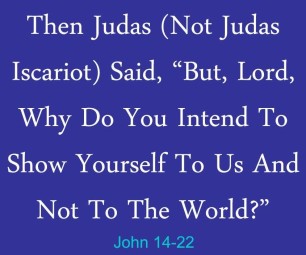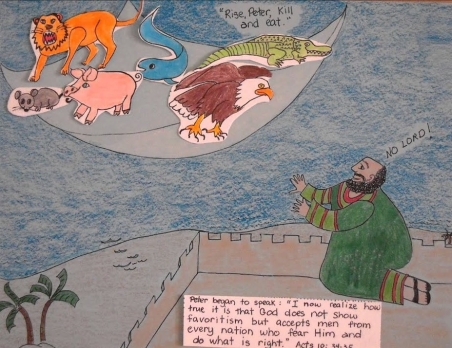First, read the text: John 14:23-29.
 Here’s the sermon:
Here’s the sermon:
Whose words do you cling to when you are in need? When you are sick, whose voice comes to mind to comfort or instruct you?
Consider a coach’s pep talk before a big game, or a mentor’s words of advice.
Once in a great while these people’s words may be truly inspired, or the person delivering them may happen to be a master rhetorician. But I think that for the most part, mentors don’t have any uniquely brilliant words. If you read that coach’s pep talk as a transcript, it might sound a little silly, even trite.
Often as a pastor I feel like I don’t have anything that special to say – but I know it’s important to say the simple things, especially when it’s hard – “God loves you.” “You are forgiven.” “Peace be with you.”
The words from the coach, mentor, or even me, could hit completely differently coming out of someone else’s mouth. I had a bad cold this week and there’s always a small part of me that wants to hear my mom’s advice, even if I know what she’s going to say, even though someone else might tell me the same…
The folks who set the lectionary texts should’ve started this gospel passage one verse earlier. It’s weird that it starts – Jesus answered. What’s the question? The question that frames this whole passage is the other Judas asked, “Lord, how is it that you will reveal yourself to us, and not the whole world?”
It’s a good question. Or in the words of Jesus Christ Superstar, “If you’d come today You could have reached a whole nation Israel in 4 BC Had no mass communication.” But Jesus says, “those who love me will keep my word.”
It’s not that Jesus had magical words that transformed people. This peace that Jesus talks about, the peace not like the world gives, but untangles your troubles, wards off fear, doesn’t come from magic words, but from a relationship. It comes from love. Think about how for you it would completely change the words “peace” or “I love you” depending on who it comes from.
Judas’ question is quite important, actually. Why did the omnipotent God of the universe choose to come in such a particular, humble way. The one who created the sky surely could’ve written upon it the secrets of the universe, or at least written, “listen to Jesus.” Sure, that would’ve been the spectacle of the week, but it wouldn’t lead to deep belief, trust, transformation, or love. At least not lasting.
It’s the relationship that makes the words ring in your ears, long after the person is gone. The relationship that makes the words matter. God chooses, even in the aspects of the trinity, to come to us and be defined primarily by relationship – father, son/savior who walked the dusty earth and ate our food, sat down with Judas and love was not abstract. Jesus is saying that when he leaves them, he won’t leave them orphaned, but the third person of the trinity, the Holy Spirit, in Greek paraklete, translated here the Advocate, the encourager, will be with you.
It’s all a gift – that peace – you don’t find it, earn it, or understand it. Jesus says he gives it. It is always and only a gift. And yes, some people find it in the words on the page or spoken from a pulpit, but I would argue that most often the conduit through which that peace comes is relationship – specifically, love. Jesus says here that it’s love that causes someone to keep his words.
Recently I was talking with friends about popular writer and speaker Brene Brown, who writes on vulnerability and courage. I watched her Netflix special a few weeks ago and realized that she’s really charismatic – connects with her audience relationally – and I think that’s the key to a lot of these type of people breaking through. I bet that most self-help and advice that we take seriously it’s because we feel connected somehow to the person giving it, or someone we trust recommended it.
Often love is the key that opens up people’s faith lives as well. Someone you love sat next to you in a pew and sang so badly but you loved every minute because you loved the person. Someone you look up to had a deep faith you couldn’t understand. Love hands these words down. Love is where the Holy Spirit lives.
I don’t believe in magic words. I believe in stories, relationships, and most of all, love. This is the God we know, and how God comes to be known.
No perfect combination of words is going to win that Facebook argument, if you don’t know the person you’re talking to. The temptation is that we think that our words are strong enough. But they’re not. I believe that the best chance we have of healing the divides in our country and world are not debates but dinners.
Relationship changes us, makes words come to life and we keep those words and live them out. Just across the river all of the flags set in rows at Arlington are powerful, but it changes when you know someone who has or could give their life in service to country. Those words spoken as the flag is handed over at the graveside mean something more because the love of that person now needs to be kept alive, needs to find peace that can grapple with loss.
We hear endlessly on the news about migrants and refugees. But it changes when you know someone. The last couple weeks when Lutheran Pastor, Betty Rendon, and her husband, Carlos, were suddenly detained by ICE, it stirred Lutheran pastors and our denomination. They’re scheduled for deportation on Tuesday, and it makes me worry for people I know, those in our own congregation, whose asylum paperwork waits in a file somewhere, just like Pastor Betty’s did.
Jesus teaches us that the key to this is love. That peace is unlocked It’s the relationship that makes the words ring in your ears, long after the person is gone.
We’re celebrating 250 years of this congregation. What held them together all this time? A scrappy band of Lutherans for sure – through generations this church and its people haven’t had it easy. But the relationships, the connection, made the faithfulness to sustain this place possible.
May you, like all who came before, find peace here. May the love of Jesus through people, meals, relationships, give you words to cling to when the days are hard, and a song to sing in celebration. May this love compel us to see how we’re all connected, and that this love that brings peace is to be shared. Thanks be to God. Amen.

